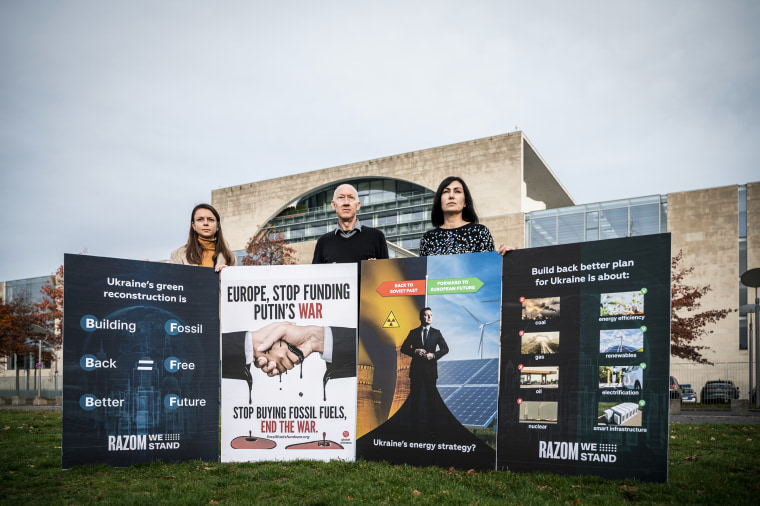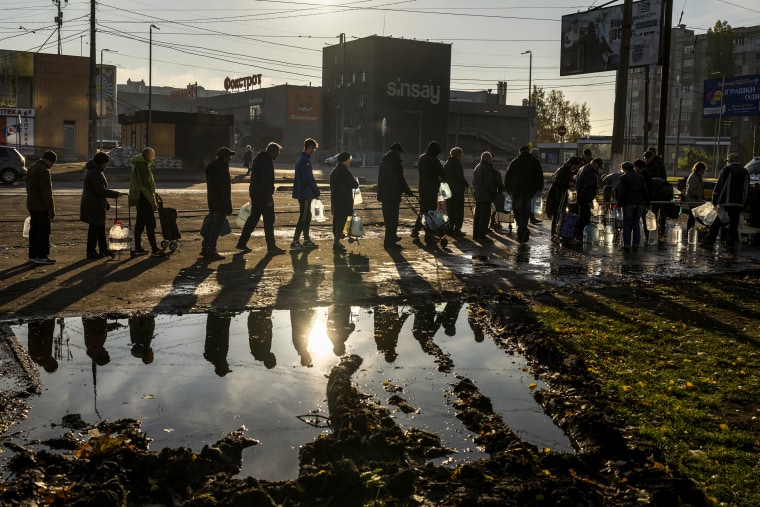When world leaders and international experts met Tuesday to discuss how to rebuild Ukraine, they were joined by a small group hoping to make a big impact on the country’s energy future.
Alongside Ukrainian President Volodymyr Zelenskyy and German Chancellor Olaf Scholz was Svitlana Romanko, an environmental lawyer and founder of Razom We Stand, a Ukrainian climate advocacy group that is pushing for the Ukrainian government to “greenify” the nation’s reconstruction.
Among its primary suggestions are transitioning to renewable energy, building energy efficient buildings and making industry more sustainable. These are goals that the group says would put Ukraine in a position to no longer be dependent on fossil fuels. It’s a mission that they see as also tied to their own national security.
That perspective is echoed by some in the Ukrainian government.
“Why did the war happen? Because for decades, Russia tried to weaponize its energy resources in Europe, including in the Ukraine,” Oleg Ustenko, an economic adviser to Zelenskyy, said in a phone interview. “Based on their strategy, we all should be as dependent as possible on fossil fuels. But now it is very clear that Russia will never again be a reliable source of energy. We have to rethink our strategy and decrease our dependence on Russian fossil fuels.”
The event, titled the International Expert Conference on the Recovery, Reconstruction and Modernisation of Ukraine, brought together people from around the world to discuss Ukraine’s recovery efforts. Though the war in Ukraine is ongoing, reconstruction plans are in the works, with a German lobby group recently calling for an effort that would mirror the Marshall Plan, which helped rebuild Europe after World War II.
Ukraine has sustained about $349 billion in damages to date. In rebuilding, the nation must decide whether it wants to return to fossil fuels, or build a cleaner, greener economy, Ustenko said.
For some climate activists, Russia’s war in Ukraine has served as a call to action in a decadeslong climate emergency. But there is some optimism that the rebuild could lead to Ukraine becoming one of the greenest countries in the world.
“The world will see that Ukraine is in an amazing situation, that there is a way after the war to rebuild in a climate-friendly manner,” said Jason Kirkpatrick, senior communications manager at Razom We Stand. “Ukraine could be a model for the world.”
And those are moves that other climate advocates hope could pave the way for changes beyond Ukraine.
“The war in Ukraine has shown us the tools we actually have at our disposal to end our reliance on fossil fuels,” said Kjell Kühne, a German climate researcher and activist at the University of Leeds in England. “Russia’s war has stripped away the excuses for a delay in action.”
In the near term, there’s less optimism. Razom We Stand has repeatedly called for a total and permanent embargo on Russian oil and gas and an immediate end to all investments into Russian energy companies, though Russian fossil fuels continue to be bought and sold in some parts of the world. To date, the U.S. has banned all Russian oil and gas imports, and the European Union recently released more sanctions on imports of Russian crude oil within six months and Russian petroleum within eight months.

But the E.U. exempted certain crude oil imports by pipeline and stopped short of banning Russian natural gas imports. Millions of barrels of Russian oil and gas flow into Europe weekly via maritime routes. The European Union has spent over 100 billion euros and counting on Russian coal, oil and gas since the war began, according to Climate Action Network Europe.
Several U.S. companies have invested in Russian fossil fuel projects, according to Kühne, who established the Leave It in the Ground Initiative, or LINGO, which tracks “carbon bombs” — projects that will emit 1 billion metric tons of carbon dioxide in their lifetime, as defined by LINGO. Prior to the invasion, notable U.S. companies invested directly or through investors in Russian “carbon bombs,” according to a LINGO database.
Romanko said many nations have failed to do what is necessary: halt the use of all fossil fuels, as quickly as possible. She cited the plans released in March by the International Energy Agency to cut reliance on Russian fossil fuels, and fossil fuels overall, in 10 steps; no government has implemented these strategies, she said.
“Unfortunately, Europe is still buying fossil fuels and sponsoring the war,” Romanko said. “Yes, they help Ukraine in many ways, but even some conversations about the green reconstruction of Ukraine sound odd to me when Europe continues to buy Russian fossil fuels every day.”
